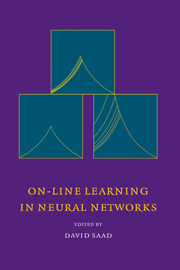Book contents
- Frontmatter
- Contents
- Acknowledgements
- List of contributors
- Foreword
- 1 Introduction
- 2 On-line Learning and Stochastic Approximations
- 3 Exact and Perturbation Solutions for the Ensemble Dynamics
- 4 A Statistical Study of On-line Learning
- 5 On-line Learning in Switching and Drifting Environments with Application to Blind Source Separation
- 6 Parameter Adaptation in Stochastic Optimization
- 7 Optimal On-line Learning in Multilayer Neural Networks
- 8 Universal Asymptotics in Committee Machines with Tree Architecture
- 9 Incorporating Curvature Information into On-line Learning
- 10 Annealed On-line Learning in Multilayer Neural Networks
- 11 On-line Learning of Prototypes and Principal Components
- 12 On-line Learning with Time-Correlated Examples
- 13 On-line Learning from Finite Training Sets
- 14 Dynamics of Supervised Learning with Restricted Training Sets
- 15 On-line Learning of a Decision Boundary with and without Queries
- 16 A Bayesian Approach to On-line Learning
- 17 Optimal Perceptron Learning: an On-line Bayesian Approach
9 - Incorporating Curvature Information into On-line Learning
Published online by Cambridge University Press: 28 January 2010
- Frontmatter
- Contents
- Acknowledgements
- List of contributors
- Foreword
- 1 Introduction
- 2 On-line Learning and Stochastic Approximations
- 3 Exact and Perturbation Solutions for the Ensemble Dynamics
- 4 A Statistical Study of On-line Learning
- 5 On-line Learning in Switching and Drifting Environments with Application to Blind Source Separation
- 6 Parameter Adaptation in Stochastic Optimization
- 7 Optimal On-line Learning in Multilayer Neural Networks
- 8 Universal Asymptotics in Committee Machines with Tree Architecture
- 9 Incorporating Curvature Information into On-line Learning
- 10 Annealed On-line Learning in Multilayer Neural Networks
- 11 On-line Learning of Prototypes and Principal Components
- 12 On-line Learning with Time-Correlated Examples
- 13 On-line Learning from Finite Training Sets
- 14 Dynamics of Supervised Learning with Restricted Training Sets
- 15 On-line Learning of a Decision Boundary with and without Queries
- 16 A Bayesian Approach to On-line Learning
- 17 Optimal Perceptron Learning: an On-line Bayesian Approach
Summary
Abstract
We analyse the dynamics of a number of second order on-line learning algorithms training multi-layer neural networks, using the methods of statistical mechanics. We first consider on-line Newton's method, which is known to provide optimal asymptotic performance. We determine the asymptotic generalization error decay for a soft committee machine, which is shown to compare favourably with the result for standard gradient descent. Matrix momentum provides a practical approximation to this method by allowing an efficient inversion of the Hessian. We consider an idealized matrix momentum algorithm which requires access to the Hessian and find close correspondence with the dynamics of on-line Newton's method. In practice, the Hessian will not be known on-line and we therefore consider matrix momentum using a single example approximation to the Hessian. In this case good asymptotic performance may still be achieved, but the algorithm is now sensitive to parameter choice because of noise in the Hessian estimate. On-line Newton's method is not appropriate during the transient learning phase, since a suboptimal unstable fixed point of the gradient descent dynamics becomes stable for this algorithm. A principled alternative is to use Amari's natural gradient learning algorithm and we show how this method provides a significant reduction in learning time when compared to gradient descent, while retaining the asymptotic performance of on-line Newton's method.
Introduction
On-line learning is a popular method for training multi-layer feed-forward neural networks, especially for large systems and for problems requiring rapid and adaptive data processing. Under the on-line learning framework, network parameters are updated according to only the latest in a sequence of training examples.
- Type
- Chapter
- Information
- On-Line Learning in Neural Networks , pp. 183 - 208Publisher: Cambridge University PressPrint publication year: 1999
- 1
- Cited by



